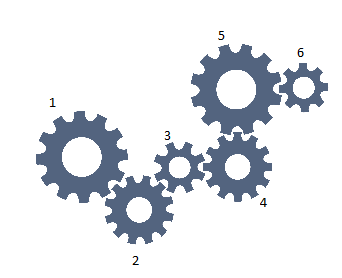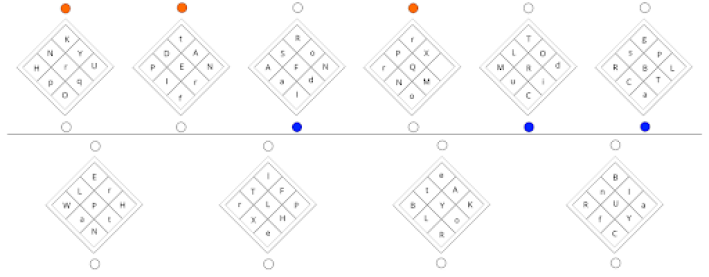Achieve Success in the AON Test with Our Complete Prep Course
- Overview
- Curriculum
- Sample Questions
- Reviews
The AON test is an incredibly demanding examination, but necessary for entry into many careers and positions. Failure could mean losing the chance to enter or advance into the vocation you belong in. That’s why we’ve designed our AON Assessment test prep course. We’ve found the tips and shortcuts you need to successfully complete your test and find the job of your dreams.
Prepterminal’s AON Assessment Test prep course will show you:
- A comprehensive explanation of each of the AON test types
- Actual test questions, and explanations of how to complete them
- Time-saving method for faster test completion
- How to take your AON assessment without stress
Let’s take a look at what the AON assessment is.
What Is an Aon Assessment Test?
The AON test is a tool used by companies to assess the aptitude levels of current and potential employees. This is done to see how a candidate will perform when presented with a series of reasoning-based challenges. These challenges are separated into categories:
There are several variations of the Aon Assessment Test:
- Verbal Reasoning (Scales Verbal)
- Numerical Reasoning (Scales Numerical)
- Aptitude Test to Measure Numerical Reasoning (scales numerical)
- Aptitude Test to Measure Numerical Reasoning (scales EQL)
- Logical Thinking (Scales CLS)
- Inductive-Logical Thinking (CLS)
- Logical Reasoning (Scales CLX)
- Inductive-Logical Reasoning (CLX)
- Deductive Reasoning (Scales LST)
- Deductive Logical Thinking (LST)
- Mechanical Reasoning (Scales MTU)
- 3D Spatial Reasoning
- Situational Judgement Test
- Inductive Logical Thinking
- Deductive Logical Thinking

Cut-e/AON Prep Course
Last Updated: Jul 24, 2024
CUT-e AON Prep Guide
Course Content
- 1Verbal ReasoningBuy this Course: Get full access to all lessons, practice tests and guides.
- 2AnalogiesBuy this Course: Get full access to all lessons, practice tests and guides.
- 3AntonymsBuy this Course: Get full access to all lessons, practice tests and guides.
- 41/2/3/4 OperationsBuy this Course: Get full access to all lessons, practice tests and guides.
- 5TablesBuy this Course: Get full access to all lessons, practice tests and guides.
- 6PercentagesBuy this Course: Get full access to all lessons, practice tests and guides.
- 7RatioBuy this Course: Get full access to all lessons, practice tests and guides.
- 8Switch ChallengeBuy this Course: Get full access to all lessons, practice tests and guides.
- 9Cut-E Spatial Ability GuideBuy this Course: Get full access to all lessons, practice tests and guides.
- 10Scales CLS Practice TestBuy this Course: Get full access to all lessons, practice tests and guides.
- 11Scales LSTBuy this Course: Get full access to all lessons, practice tests and guides.
- 12Mechanical ReasoningBuy this Course: Get full access to all lessons, practice tests and guides.
- 13Mechanical TestBuy this Course: Get full access to all lessons, practice tests and guides.
- 14Cut-E Behavioral Assessments Written GuideBuy this Course: Get full access to all lessons, practice tests and guides.
- 15Cut-E Behavioral AssessmentsBuy this Course: Get full access to all lessons, practice tests and guides.
- Cut-E Behavioral Assessments Written Guide
- Cut-E Shapes Behavioral Assessment - Emotional Trait Practice Test
- Cut-E Shapes Behavioral Assessment - Intellectual Trait Practice Test
- Cut-E Shapes Behavioral Assessment - Interactive Trait Practice Test
- Cut-E Shapes Behavioral Assessment - Operative Trait Practice Test
- 16BONUS Interview Prep Video GuideBuy this Course: Get full access to all lessons, practice tests and guides.
What Are the Types of Aon Assessment Tests?
Each one of these categories represents a different facet of reasoning or logic that may pertain to your potential career. With each section, there will be a distinct set of questions meant to test your ability to operate within that particular logical category.
Verbal Reasoning (scales verbal)
This part of the AON test is meant to find whether you can analyze written sorts of information and apply it to different scenarios. You will be presented with various pieces of data including lists, articles, and instructions. You must then answer questions based on this data, so employers can see how well your verbal reasoning skills would be in the workplace.
Numerical Reasoning (scales numerical)
The numerical reasoning section is split into two categories: scales numerical and scales EQL.
Scales Numerical: This part of the numerical reasoning section presents you with a complex set of numerical data, and you must use logic and mathematical knowledge to draw reasonable conclusions.
This data can take the form of tables and charts, and you will have to pull the most relevant pieces of information to answer a set of questions.
Scales EQL: Another examination of your numerical competency, the Scales EQL section involves assessing equations containing missing elements. You need to fill in these missing elements, and each question is randomly generated for different participants.
Inductive-Logical Thinking (CLS)
In this section of the AON assessment, you will be required to find a link between two separate table sets, find what rules govern each dataset, and then assign different tables to their appropriate categories.
Inductive-Logical Reasoning (scales CLX)
This section again will present various table categories, and you must find the relationship that connects two tables together. This section focuses more on patterns rather than rules, and you must find what pattern the two tables share. From there, you need to apply that pattern to a different set of tables.
Deductive Logical Thinking (scales LST)
This part of the AON test will give the participant a grid containing different types of objects. Every object type will appear once per column and once per row. One part of the grid will contain a question mark instead of an object. Your objective is to find what object belongs in the missing square, using deductive reasoning to reach the most logical conclusion.
Mechanical Reasoning (scales mtu)
Here, the test will shift to focus on your mechanical and technical competency. In this section, you will be presented with a graphic representing a mechanical element, and a series of questions about that element. You must identify the correct answer from the provided materials. The mechanical reasoning section is often used to assess those applying for mechanical or technical roles within a company, like an engineer or technician.
3D Spatial Reasoning (scales SPR)
Testing your ability to think about objects in a three-dimensional space, the 3D Spatial Reasoning section will give the participant a group of shapes. From this set of shapes, you must create a pattern that forms a separate geometric shape.
Situational Judgement Test (SJT)
The situational judgment test is designed to assess how candidates will react to a particular situation. You will be provided with scenarios and asked to make decisions based on the information provided. The situations are meant to simulate something that could happen in a real-life workplace, and the answer options are a variety of reasonable responses.
Inductive Logical Thinking (IX)
Intended to assess inductive logical ability, this section provides the participant with a group of objects. All these objects adhere to a central rule except for one. You must identify what exactly this rule is and find the object within that group that doesn’t follow this rule.
Deductive Logical Thinking (SX)
Assessing deductive instead of inductive thinking, this section requires the participant to choose what operations will achieve a given result. The objects within this question will interchange based on a central rule. You must identify the rule, find the right operations, and get the result.
AON Assessment Practice Test Course
With a variety of sections and many different concepts to understand, studying for your AON test is vital. The best way to do so is with our streamlined test prep modules. Each module covers a different type of question present on the AON assessment, including:
While the test course does not currently cover each type of AON assessment, it is constantly being updated to include new questions and new categories. Let’s look at some questions, and how Prepterminal’s course can help you solve it.
AON Assessment Test Questions and Answers
To give you a sample of each module, we will look at a brief description, sample question, and an explanation for how you should solve that question.
Numerical Ability Module
The Numerical Ability module will help you with AON test questions involving various numerals and datasets. This section of the test will generally involve 37 tasks, and you are given a time limit of 12 minutes. You will be presented with a statement, and you must determine whether that statement is true or false based on the tables, graphics, and other information provided.
Let’s look at an example question:
The following table shows some information regarding the familiar status of children in a private school. Answer questions 3 – 5 based on the data provided by this table.

- A:3/7
- B:3/4
- C:4/7
- D:1/4
- E:1/7
Explanation:
The total number of students is 45 + 17 + 140 + 21 + 22 = 245 students.
Students who live with only one parent belong to 4 categories: students with divorced parents who live with their mother, students with divorced parents who live with their father, students with non-divorced parents but whose mother or father is not alive, and they live with the other parent. Thus, the total number of students who belong to these 4 categories is
45 + 17 + 21 + 22 = 105 students.
Hence, the part of student group A, who live with only one parent, is:

Verbal Ability Module
This AON test module will help you with verbal ability questions, including scales verbal. This section will give you more tasks than the numerical ability test section, with 49 questions in total. You are given 12 minutes to complete the verbal ability section.
Let’s look at an example question:
Below is a list of assumptions that can be made about Percy. Determine whether or not the statement is true.
Assumptions:
- Pets are always collared
- Percy the bear has a collar on him
- Percy lives in the woods
Conclusion: Percy the bear is a pet
- A:Correct
- B:Cannot be determined based on the information available
- C:Incorrect
Explanation:
- Study how the assumptions relate to each other:
Pets are always collared
Percy the bear has a collar on him
- Group all common thoughts together:
Pets are always collared, and Percy the bear (who lives in the woods) has a collar on him.
- Compare the conclusion with the (grouped) assumptions.
Pets are always collared, and Percy the bear (who lives in the woods) has a collar on him. Although it is mentioned in the assumptions that Percy, who is a bear, lives in the woods, it specified that all pets wear collars, and since Percy has a collar on him, then he is a pet.
Mechanical Judgement Module
These AON assessment test questions will analyze your ability to understand the basic principles of physics and mechanics. You will have to complete 24 questions for this test section, and you’ll be given 15 minutes to do so. The module will show you example questions and show you how to complete them quickly.
Let’s look at an example problem:

- A:Clockwise
- B:Counter-clockwise
- C:It cannot be determined
Explanation:
Gears are used to change the direction of rotation (and the speed of rotation as well).
All gears in contact with each other change direction of rotation with respect to the previous ones. Thus, if gear 1 rotates anticlockwise, then gear 2 rotates clockwise, gear 3 anticlockwise, gear 4 rotates clockwise, gear 5 anticlockwise and finally, gear 6 rotates clockwise.
Abstract Judgement Module
This module will show you how to deal with pattern analysis, and the best way to interpret the graphics provided. You will be presented with visual data, and you must make assumptions based on how you interpret said data.
Let’s look at a Scales CLS practice question:

- 1:Figure 1 Top (orange)
- 2:Figure 3 Top (orange)
- 3:Figure 1 Bottom (blue)
- 4:Figure 3 Bottom (blue)
- 5:Figure 2 Top (orange)
- 6:Figure 4 Top (orange)
- 7:Figure 2 Bottom (blue)
- 8:Figure 4 Bottom (blue)
Explanation:
Figures with a lowercase ‘r’ bear an orange dot; those with an uppercase ‘R’ bear a blue dot.
Behavioral Judgement
The personality examinations on the AON test are not as straightforward as many other sections. For sections like the situational judgment test, you will be given scenarios and asked how you would react.
Let’s look at an example question:
- I am an optimist but that doesn’t mean I am a cheerful person.
- I prefer to act based on what has been proven to be effective.
- I always follow through with my commitments.
- I believe that needless sharing or boasting about achievements is egotistical and should be avoided.
- I face situations even if I am not fully prepared.
- Doing things conventionally has its benefits.
- I like conversing with other people.
- I am very methodical in my decision-making.
- I am not afraid to think outside of the box when needed.
- I believe that I am capable of handling my problems on my own.
- I tend to find the root cause of a problem.
- I fail to be methodical even if I tried.
- I sometimes cheat when playing solitaire.
- I am suspicious of people willingly doing something for me.
Explanation:
The correct answers to this question vary depending on the job role. To learn more, enroll for our AON assessment prep course today for our guides on how to tailor your answers to impress for any job role.
How are the AON tests structured?
The structure of the AON test will always be the same, but what tests you take depend on what type of job you are going for, and what the objectives of your potential employer could be. For example, if you intend to get a position as a technician or an engineer, the assessment may focus more on the mechanical reasoning AON tests.
But for a general overview, AON assessments follow a similar structure. First, you will be given a short introduction that describes what the test questions will entail. After, you will be presented with an interactive component designed to show you what you will need to do for each test section. It’s important to pay close attention, as you will need to perform certain actions to proceed to the next part of the AON test. Example questions are provided to ensure you have understood each explanation.
Unlike other areas of the exam, this introductory section does not have a set time limit. You may take your time working through the example problems. From there, you are brought to a final page where bullet points outlining the test are listed. Then, you will begin the test.
How to Pass the AON Test
Passing the AON assessment can determine the future of your career. While you may feel you have a good base of knowledge already, this test requires lightning-fast memory recall, pattern identification, and grueling personality analysis. If you want to rid yourself of uncertainty, and pass the test quickly and easily, you’ll need our AON test prep course.
You deserve a better job, to achieve your goals, and to prosper, so don’t leave it up to chance; pass the assessment stress-free by enrolling in Prepterminal’s prep course today!

Created by: Michael Lerner
BSc, Psychometric Tutor, Prepterminal Test Expert
2541 students, 4.5, 414 Reviews
Hey, welcome to our actionable Cut-e/AON Prep Course page. I’m Michael, PrepTerminal’s Cut-e/AON Prep Course in-house expert. I am here to assist you with any queries about the Cut-e/AON Prep Course. Don’t hesitate to contact me at [email protected].

